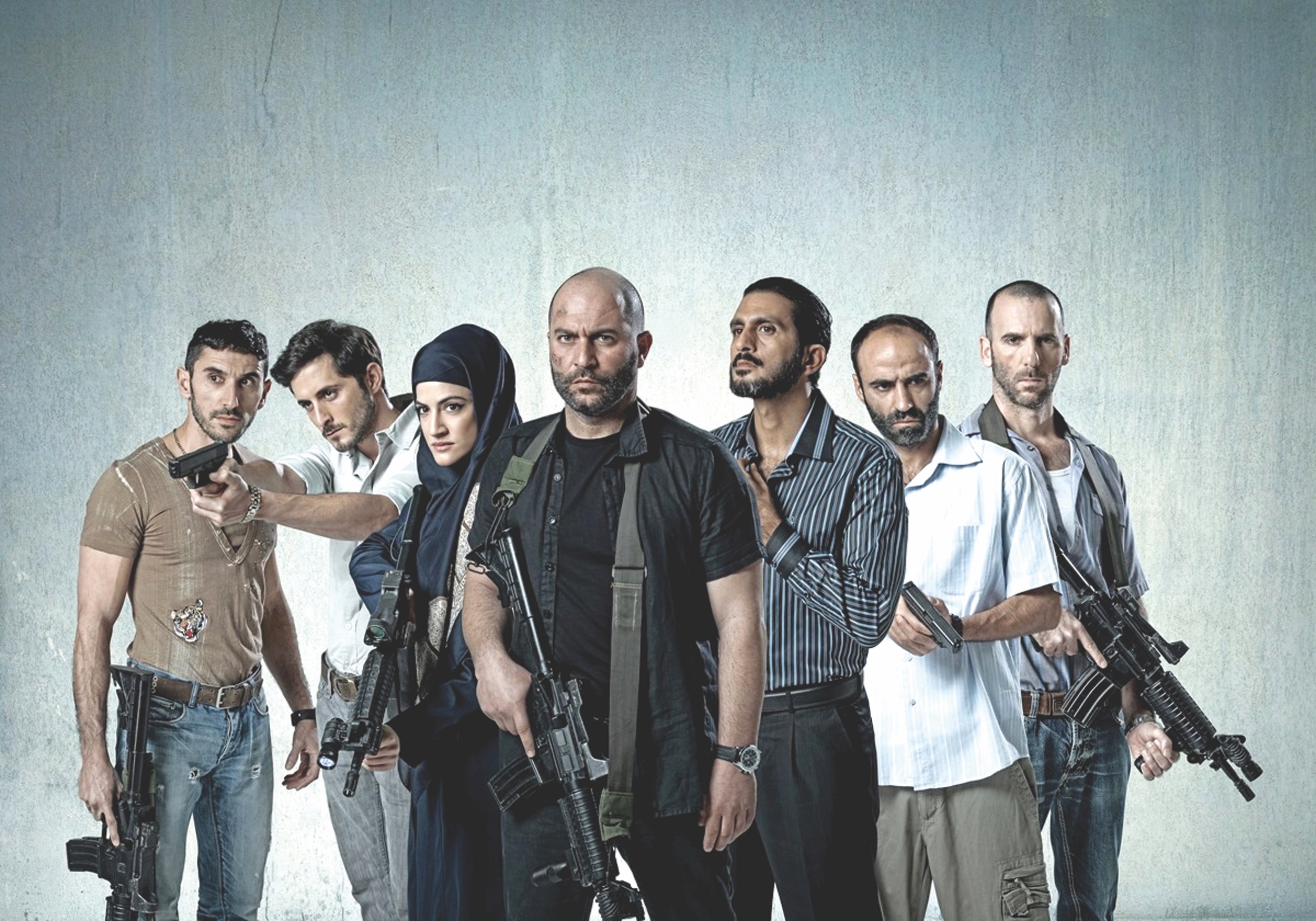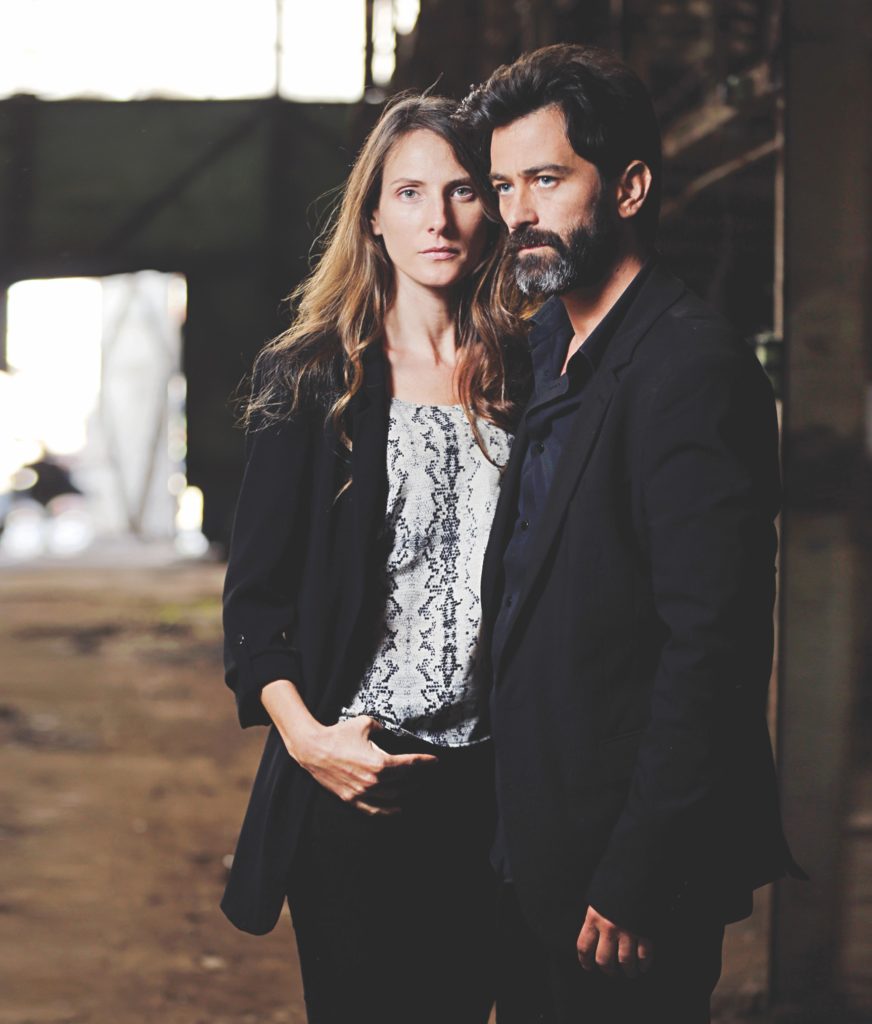 The cast of “Fauda.” Photo courtesy of Netflix.
The cast of “Fauda.” Photo courtesy of Netflix. The impact of Israeli programs on American television has taken an almost biblical route: In the beginning, there was “BeTipul,” which begat HBO’s “In Treatment”; “Hatufim” begat Showtime’s “Homeland”; and Keshet Studios begat NBC’s “The Brave” and CBS’ “Wisdom of the Crowd,” both based on television shows born in Israel.
And now, through the proliferation of online streaming services such as Hulu, Amazon Prime and Netflix, Israeli concepts are dispersed throughout the world, being translated for international audiences.
“Israel’s influence on the global TV marketplace is remarkably disproportionate to the size of the country,” said Andrew Wallenstein, co-editor-in-chief of Variety. “It’s hard to believe a nation so small can have such a big impact.”
The vehicle for much of Israel’s entertainment impact on the world is Netflix, which isn’t just the home of “Stranger Things” and stand-up comedy specials. It’s also where subscribers access television shows and films from across the globe, including the two most recent straight-from-Israel TV success stories, “Fauda” and “Mossad 101.”
Both programs related to Israel’s intelligence agency are being spotlighted on the streaming service and at the upcoming Israel Film Festival, which runs Nov. 5-21. New episodes of both dramas will screen as part of the festivities — “Mossad 101” on Nov. 15 and “Fauda” on Nov. 16 — before most audiences have a chance to see them elsewhere. A conversation about the state of the television market, with a panel of Israeli and American executives, will take place following the “Mossad 101” screening.
Netflix, boasting 109 million members in more than 190 countries, is a major distributor of both original Israeli content and repurposed Israeli formats, like the teen drama “The Greenhouse Academy,” the BBC drama “The A Word,” and the forthcoming original “The Good Cop,” a dramedy featuring Tony Danza. But in addition to exporting formats, the Israeli TV shows themselves are having a moment. KCET has been broadcasting “Hatufim” (“Prisoners of War”), and Hulu has announced distribution for the Israeli thriller series “False Flag.” Amazon Prime has “Srugim,” a show about Orthodox singles living in Jerusalem. Netflix also has “Mossad 101” airing in Hebrew with English subtitles, and the Arabic-and-Hebrew “Fauda.”
“It’s a credit to Netflix that it was willing to see if an American audience could take to a show that is part Hebrew, part Arabic,” Wallenstein said.
Netflix’s wide reach also means that “Fauda” and other Israeli TV shows are being seen in more countries than their creators ever could have imagined.
“It’s shown in 200 countries!” said Israel Film Festival director Meir Fenigstein, rounding up from Netflix’s official number of 190 countries. “There has never been an Israeli film shown in 200 countries.”
In addition to “Mossad 101” and “Fauda,” the festival is screening two other television shows, “Your Honor,” a thriller about a judge’s involvement with a notorious crime family, and “Harem,” a fictional tale about the phenomenon of cults and their destructive consequences. With so much Israeli material being sold to the United States, and with last year’s festivals in Cannes, Berlin and Toronto featuring TV programming, it was time for the Los Angeles festival to get in on the conversation, Fenigstein said.
For Netflix, things really got hot with “Fauda” (“chaos” in Arabic). The series lives up to its name, with chaotic relationships and situations that are ready to explode, sometimes literally, as a retired Mossad agent is reactivated into service to try to eliminate a terrorist who had been presumed dead. Episodes are laden with tension, violence and ethical justifications for deception.
When the show started airing in Israel in 2015, Larry Tanz, vice president of acquisition at Netflix, said he spent two late nights bingeing the series.
“It became clear to me that we should invest in a meaningful way to premiere the show globally, outside of Israel,” he said. “It’s brilliantly executed and also quite topical and relevant.”
Wallenstein said it’s no surprise that the foreign-language program has managed to find an audience in America — and beyond.
“Though it captures the story of just one region of the world, that drama taps into more universal themes that resonate even with those who don’t necessarily know what’s going on in the Middle East,” he said.
Netflix worked with Yes, the Israeli satellite channel that produced the show, on a multiseason partnership and the rest, as they say, is history. Local festival audiences will be treated to the world premiere, but Season Two will not be available on Netflix until March 2018.
“For many people watching, it’s very likely that it’s the first time they have ever seen an Israeli TV show,” Tanz said.
“It’s a credit to Netflix that it was willing to see if an American audience could take to a show that is part Hebrew, Arabic.” – Andrew Wallenstein
To Fenigstein, “Fauda” resonates because of its truth — specifically that of Lior Raz, the retired Israeli special forces soldier who co-created and stars in the show.
“He knows [that world] inside out,” he said. “He doesn’t even have to act. He’s playing himself.”
The show also portrays Palestinians in a very human way, Fenigstein added. “Even the Arab populations in other countries watching it, it looks real to them.”
Afghan-American actress Azita Ghanizada got hooked on “Fauda” after it was recommended by novelist Stephen King, she told the Journal.
“‘Fauda’ presented a balanced and nuanced perspective of the Israeli-Palestinian conflict, the fight against terrorism and the complication of geopolitics,” she said. “The humanity of the characters dove into a place that isn’t shared in most narratives surrounding the conflict, and the Muslim characters were deeply human, not the caricatures you often see in Hollywood films and TV.”
Ghanizada, founder of MENA (Middle Eastern North African) Arts Advocacy Coalition, added that “Fauda” “shared how complicated both sides of the conflict are, allowing me as the viewer to go on the journey with each character regardless of religion or national identity.”
“Mossad 101” (“Hamidrasha,” meaning “The Academy” in Hebrew) takes a different perspective — and tone. A scripted dramedy, it focuses on a training course for Mossad cadets.
“The series was used from the beginning as a platform through which we could show different Israelis from different perspectives getting to another Israeli melting pot, but this time, a very elite one: the Mossad training course,” said Daniel Syrkin, the show’s co-creator and director, in a Hebrew email interview.

The first season featured diverse characters, including a Persian Israeli, a Russian Israeli, a genius psychologist, a startup millionaire and American-Israeli brothers from Los Angeles. The course is guided by a Mossad officer whose motives are suspect and whose work relationships are complicated. An essential question throughout the series: What would these cadets do to protect their country?
“We dealt less with the famous operations of the Mossad and more with the human aspect and allowed ourselves to do this with a wink — there was a lot of humor and lightness in the first season,” Syrkin wrote.
Several critics indicated that it was, perhaps, too light-hearted, focusing more on the competitive spirit and relationships between trainees than on the serious fact that they were training to seduce, kidnap and even assassinate targets. Syrkin said the second season — the first episode of which will have its U.S. premiere at the Los Angeles screening — had to be more serious and “more respectful of the legend of the Mossad.” This season, they’re still asking the question about love of country, he reports, but “the plot is bloodier, more suspenseful and has less humor,” and the shared enemy this season is “international Islamic terror — that’s not a group that any Israeli is ready to
joke about.”
Now that the show has a global audience, Syrkin said, “it excited me to think that the scenes we were shooting at that moment in Hebrew for an Israeli audience, that deal with Israeli dilemmas, will get to the wider world and interest also viewers that know very little about Israel.”
This could happen more often in the future, Netflix’s Tanz said, noting that the streaming service already has announced plans for more original series with “Fauda” creators Avi Issacharoff and Raz.
“Maybe we have increased the demand for Israeli TV by showcasing some of the best of it,” he said. “Israel, in particular, is a strong source of compelling content, so we expect to find more opportunities there.”





















 More news and opinions than at a Shabbat dinner, right in your inbox.
More news and opinions than at a Shabbat dinner, right in your inbox.